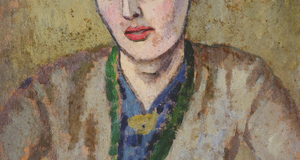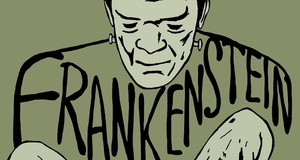From Comrades to Lovers: "The Hollow Men" and the Broken Homosocial Spectrum
By
2009, Vol. 1 No. 11 | pg. 2/2 | « Eliot’s poem is full of references to eyes, “Eyes [they] dare not meet,” (2:1) and eyes that are conspicuously absent as in section four. These eyes refer to being watched and scrutinized by society. The section in which the poem’s speaker dares not meet the eyes is the only section of the poem which has no mention or allusion to the relationship of the hollow men to each other, showing that they are hiding from these societal eyes. There are eyes and voices that seem disconnected from anything substantial, but of which the speaker is afraid. The disembodied voices (2:7) are distant and solemn, implying that what they are saying is both disconnected from the speaker and serious. This tone could be in criticism of their sexual preference. Society is seriously critical about sexual orientation, but these critics are quite distancing to those about whom society complains. In the beginning of section four, the eyes disappear and the reader is given a much more open discussion about the hollow men’s relationship to each other as they “grope together” (4:20). However, though the eyes are absent, the shame that society instills is evident in two other stanzas. First, the men “avoid speech” (4:20). Two reasons that people avoid speech are they are either embarrassed or ashamed. They do not want to discuss that which they have gathered to do, they simply want to do it and get done with it. On top of this section, the lines “In this valley of dying stars / In this hollow valley / This broken jaw of our lost kingdoms” (4:16-18) indicates that to escape the eyes, they have had to go to great lengths to find a rather inhospitable place to “grope together” (5:20). The combination of this comradeship turned to desire and the restraints which religion and society have put on these desires makes them feel trapped. One indication of this is in section two where they say “Let me also wear / Such deliberate disguises / Rat’s coat, crowskin, crossed staves” indicating that they feel the need to disguise themselves, to not let their true nature become apparent. The idea of being trapped is also evident in section five. The nursery rhyme which begins this section was originally developed by inmates at the Wakefield Prison in England (Wakefield). They sang this song every morning when they were let out for their daily run around the mulberry bush that, to this day, stands in the center of the prison yard. In some sense, these hollow men feel imprisoned by a society and religion that will not let them be as they wish to be.This contention between the men, society, and religion causes a great amount of tension. Troy Urquhart notes this aspect in analyzing the “leaning together” in the poem. “Leaning denotes the application of force, but force directed toward a central point and merely providing self-support” (Urquhart, 199). Though force is being applied from the direction of the men and from outside through society and religion, this all becomes “Paralysed force, gesture without motion” (Eliot 1:12) in that they come to a stand still, both exerting pressure and yet not getting anywhere. Yet this is a precarious position. “Should one part change the force with which it leans, the arrangement is likely to collapse,” suggests Urquhart. Should the men push harder to be accepted for their sexual preference or the church push harder to stop them, then one or the other shall fall. This wasted energy can also be seen in the nursery rhyme in section five. “The circular motion ‘round the prickly pear’ reiterates the theme of effort without result” (Urquhart, 200). These men are simply going in circles as they attempt to find a way out of the prison which society and the church have built for them. This standstill and disruption of desire could also, in another sense, be what is making these men hollow. They are unable to fulfill their desires, and find themselves pushing away their feelings to be more inline with society and religion. This pushing away of feeling, the emptying of their desire leaves them empty, as they do not have to conventional emotion and desire to fill their place. It is as if they have separated a part of themselves to be more socially acceptable, and in doing so, they have nothing left in them. Their entire being, their essence, is tied up with this part of their identity. As one of my friends once told me, “Homosexuality is not a choice that I have made, it is who I am.” These men are homosexual and denying that aspect of them leaves them hollow. The result of this tension and hollowing, this abrupt and uncompromising halting of what society sees as sexual immorality, can be seen in the last stanza. Using the same sing-song rhythm introduced with the nursery rhyme at the beginning of section five, Eliot indicates that the world will not end with a bang, but a whimper (5:29-30). The definitions of the term “bang” are many and varied. In 1937, “bang” entered the slang dictionary as a sexual innuendo to refer to intercourse which means that it had to have been in common circulation for quite some time previously (Oxford bang:6). It is possible that Eliot meant “bang” in this form which makes sense in relation to the sexual connotation of the section preceding this stanza. However, these men do not get a bang, being constantly interrupted by society and religion. Instead they whimper, the whining sigh of desire unfulfilled. It may also be said that the hollow men tried, as Guy Fawkes once did, to disrupt this constraining world in which they live with a bang. They tried to get out of the eyes by hiding in the dark corners of the world and they tried to break out of the jail the world placed them in, but their world ends because society refuses to let them be who they want to be, to have this relationship that slides through the spectrum of homosocial relationships. They don’t get a bang, they don’t create a bang, they are merely allowed a whimper. ReferencesBynum, Caroline Walker. Fragmentation and Redemption. New York: Zone Books, 1991. 133, 214, 227. Eliot, T.S. “The Hollow Men.” T.S. Eliot; The Complete Poems and Plays. London: Faber and Faber, 1969. 83-86. Oxford English Dictionary. 2007. 3 March 2007 Sedgwick, Eve Kosofsky. “From Between Men: English Literature and Male Homosocial Desire.” The Norton Anthology of Theory and Criticism. Ed. Vincent B. Leitch. New York: W.W. Norton and Company, 2001. 2434-2438. Smith, Grover. “On The Hollow Men.” Modern American Poetry. 19 Feb 2007 http://www.english.uiuc.edu/maps/poets/a_f/eliot/hollow.htm The Gunpowder Plot. 2007. 19 Feb 2007 http://www.bonefire.org/guy/gunpowder.php. The Holy Bible, New International Version. Grand Rapids: Zondervan, 1996. Psalm 23:4. The Story of Wakefield Prison & the Origin of the Nursery Rhyme. 2006. 19 Feb 2007 http://www.wakefield.gov.uk/CultureAndLeisure/HistoricWakefield/Highlights/Buildings/WakefieldPrison/default.htm Urquhart, Troy. “Eliot’s ‘The Hollow Men’.” Explicator 59.4 (2001):199-201. Suggested Reading from Inquiries Journal
Inquiries Journal provides undergraduate and graduate students around the world a platform for the wide dissemination of academic work over a range of core disciplines. Representing the work of students from hundreds of institutions around the globe, Inquiries Journal's large database of academic articles is completely free. Learn more | Blog | Submit Latest in Literature |


















